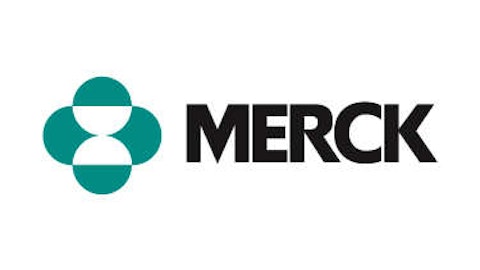Game changer, disruptive, innovative, ahead of the curve — all words and phrases you want to hear about a company in your portfolio. Not terms you generally hear about industrial conglomerates anymore. Probably the last time people said these about General Electric Company (NYSE:GE) was a hundred years ago when Edison’s electricity advances changed modern living in ways even he couldn’t have imagined.

But maybe it’s time to put those words back in the vernacular describing GE today. Since its founding in 1892 GE has its fingers in so many pies it takes a paragraph and five company websites just to describe how many industries it touches. As an infrastructure and financial services company its main divisions are: Power and Water, Oil and Gas, Energy Management, Aviation, Transportation, Home and Business, GE Capital, and Healthcare. GE is the biggest conglomerate in the US but also serves 160 countries.
Why GE is on the move again
With 305,000 employees working to make trains more energy-efficient, drill deeper for oil, detect cancers more accurately, and so much more, General Electric Company (NYSE:GE) should be considered as almost a global economic index fund as it covers financials, housing, transports, healthcare, and aviation. Just as owning Berkshire-Hathaway -B) allows you exposure to insurance, transport, housing, and retail, owning one of these stocks puts you ahead of the curve in diversifying a portfolio. Warren Buffett himself holds GE in his portfolio although it’s only a .02% stake.
The stock is trading at an 18.27 P/E with a 12.76 forward P/E. GE offers a 3.20% yield with a sustainable 50% payout ratio. The stock is up close to 25% over the last year outperforming the S&P 500. In the last week it touched a 52 week high of $23.90.
The company is in the news again (like Apple Inc. (NASDAQ:AAPL) there’s a new news tidbit almost every day. It really isn’t a boring stock.) with the announcement it’s teaming up with the NFL to study concussions and improve diagnosis and treatment in hopes of preventing permanent brain injury.
Also in the news is CEO Jeffrey Immelt’s annual shareholder letter in which he details the company’s plans to return $18 billion this year to shareholders through buybacks and dividends and reiterated the company’s commitment to a high dividend yield.
What’s really driving the stock is the innovation in various divisions that make it an alternative to owning certain individual stocks. In healthcare it’s partnering with the US Department of Veterans Affairs to develop a robot to fetch, sort, and sterilize surgical instruments. Shades of Intuitive Surgical, Inc. (NASDAQ:ISRG) In energy it has partnered with Chesapeake Energy Corporation (NYSE:CHK) in its CNG (compressed natural gas) in a Box system, a compact refueling system. As Immelt wrote in the shareholder letter, “We will lead in the shale gas revolution.”
In transports General Electric Company (NYSE:GE) has the Rail Optimization Solutions to increase efficiency for the railroads. Why buy customer Norfolk Southern Corp. (NYSE:NSC) when you can buy the company that makes money by helping it save money?
Speaking of money Immelt expects GE Capital to return a significant amount of cash to parent GE. With credit cards, middle market loans, home loans, and other financial products a portfolio can fill out its financials allocation as well as covering housing in one fell swoop. Isn’t that better than just buying financial services competitor Citigroup Inc. (NYSE:C)? Don’t forget GE has a strong appliance and lighting segment.
Competition
As a one and done stock General Electric Company (NYSE:GE) competes most closely with Berkshire Hathaway. While Berkshire Hathaway is a great company and is slightly outperforming GE, up over 30% over 52 weeks and also hitting a 52 week high on March 8 of $104.00, it has no yield. One other concern with Berkshire Hathaway is its exposure to what I would call Warren’s Whims, newspapers and some small companies that for the life of me I can’t understand why Buffett bought (Oriental Trading and Pampered Chef). As Berkshire Hathaway is an insurance giant multi-year trends toward extreme weather given its exposure to property and casualty is a drawback.
Siemens Aktiengesellschaft is GE’s most direct competitor as a diversified industrial conglomerate. The Munich, Germany based company, founded in 1847, has almost all the same interests (energy, healthcare, finance, infrastructure, appliances, etc) as General Electric Company (NYSE:GE) and slightly lower P/E at 17.18 and a forward P/E of 11.32. But the yield is slightly lower as well at 2.70%.
The PEG of Siemens is lower than GE’s (1.34) at .41 and the stock has underperformed the S&P 500, only up 9% over the last year. Undoubtedly, this is partly due to negative sentiment over European stocks in general, warranted or not.
One last reason I prefer GE to Siemens is the “shale gas revolution” (Immelt’s words) that GE is closely involved in working on several fronts in the fracking process. From the annual report,” GE Power & Water is partnering with memsys, a water technology company, to develop membrane distillation technology, which promises to be an effective, energy-efficient solution for treating wastewater generated during the gas extraction process.” If you listen to Jim Cramer for more than two days in a row you can’t get away from his belief that shale and natural gas are still our future, even more so since the President mentioned it in his State of the Union address.
The operating margin at General Electric Company (NYSE:GE) (12.18%) is better than Siemens (9.01%). The industrial segments of GE reported earnings growth of 10% and now comprise 55% of total returns according to the 2012 annual report released on March 11 .
General Electric Company (NYSE:GE) going forward
GE is currently reducing its GE Capital size to 2008 levels while it also grows the industrial segments. In particular, by 2030 infrastructure is expected to see $60 trillion in investment. The clear commitment to the dividend and buybacks are encouraging as well.
While GE once touched $60 a share in the early 2000’s, thanks to the financial crisis and its exposure from GE Capital it fell to single digits. Analysts see 10% plus five year EPS growth. GE is really a very versatile stock for an investor who wants the triple threat of growth, yield, and diversification. This is a name to keep on your radar for any pullback opportunities.
The article The Biggest Game Changer in History originally appeared on Fool.com and is written by AnnaLisa Kraft.
Copyright © 1995 – 2013 The Motley Fool, LLC. All rights reserved. The Motley Fool has a disclosure policy.




